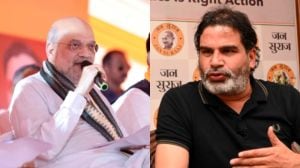As Buddha tries to put house in order, VS govt courts fiscal irresponsibility
The new LDF government in Kerala presented Budget 2006-07 for the state with a sharp rise in spending. Revenue expenditure is budgeted to increase from an average of 16.9 per cent...

The new LDF government in Kerala presented Budget 2006-07 for the state with a sharp rise in spending. Revenue expenditure is budgeted to increase from an average of 16.9 per cent of Gross State Domestic Product over the last 10 years to 19.5 per cent in the current year. This will result in a sharp increase in the revenue deficit for the state at Rs 5,415 crore. In 2005-06 the revenue deficit was Rs 3,561 crore.
Having gone for a sharp increase in expenditure on welfare and benefits, Chief Minister V S Achuthanandan’s Finance Minister Thomas Issac criticized the Centre for restricting deficits. Fiscal deficit in Kerala in 2006-07 stands at Rs 7,534 crore, up from Rs 4,513 crore the previous year.
“It is when we ask how a democratically-elected government can show such an obvious anti-people attitude, that the role of Fiscal Responsibility Legislation imposed by the Centre as part of globalization becomes very clear. Their commitment is not towards people who elected them but to certain targets fixed by experts who framed the fiscal responsibility laws, which are then enacted by some state governments, knowingly or unknowingly. This is truly anti-democratic,” Issac said.
Referring to the state fiscal responsibility legislation accepted by the previous state government in line with the framework created by the Finance Commission, Issac said: “The Centre has been thrusting targets related to income, expenditure, revenue deficit and fiscal deficit on states in such a way that it would be applicable even to future governments. The Finance Commissions have been made a tool for this. Governments, which come to power giving a lot of promises, are forced to swallow them quoting these conditions.”
In West Bengal, the budget presented by Finance Minister Asim Dasgupta after the CPI(M) government was re-elected to power shows an estimate of a revenue deficit of Rs 8,759 crore. The state has not been in a position to sign up for the Fiscal Responsibility Legislation due to the precarious fiscal position of the state.
The CPI(M) government headed by Buddhadeb Bhattacharjee appears to be making some progress on getting the state out of the financial mess, which is not an easy task.
The Fiscal performance of West Bengal in the nineties was the worst among the states. The twelfth Finance Commission estimates show that West Bengal ranked the worst among all states in terms of its revenue deficit in the years 2000-03 when its revenue deficit stood at 5.47 per cent of the Gross State Domestic Product.
The Commission report also shows that the revenue deficit in West Bengal worsened sharply from 1993-96 to 2000-03. Only next to Gujarat where the slippage was the highest, it worsened by 3.95 per cent of GSDP. Fiscal deficit in West Bengal was the second worst after Orissa. Between 2000 and 2003, fiscal deficit in West Bengal stood at 7.31 per cent of GSDP. Slippage in fiscal deficit over the period 1993-96 to 2000-03 was the worst among all states. It fell by 4.13 per cent of GSDP.
West Bengal has also been the worst performer in terms of own tax revenue collection. It collected 4.26 per cent of GSDP as taxes. Even Bihar collected more of its production as taxes (at 4.46 per cent of GDP) than West Bengal. Instead of improving, as most states did on this front, West Bengal saw a decline in its own tax revenue over the period 1993-96 to 2000-03 by 1.2 per cent of GSDP.
To tackle the financial crises in the state, the West Bengal government has been taking measures to raise its own revenues. In his budget speech, Dasgupta noted that “the ratio of revenue deficit to revenue receipt which was 90.9 per cent in 1999-2000 has noticeably fallen to an estimated 34.87 per cent in the year 2005-2006. At the same time, the ratio of fiscal deficit to State Domestic Product which increased to 9.20 per cent in 1999-2000 has sharply come down to an estimated 4.67 per cent in 2005-06.”
The state VAT, spearheaded by the West Bengal Finance Minister, is one of the instruments through which the state government hopes to improve the financial position of the state.



- 01
- 02
- 03
- 04
- 05




























